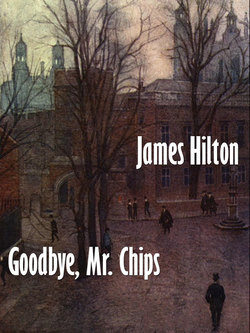Читать книгу Good-bye, Mr. Chips - James Hilton - Страница 5
ОглавлениеCHAPTER 3
It was a small but very comfortable and sunny room that Mrs. Wickett let to him. The house itself was ugly and pretentious; but that didn’t matter. It was convenient—that was the main thing. For he liked, if the weather were mild enough, to stroll across to the playing fields in an afternoon and watch the games. He liked to smile and exchange a few words with the boys when they touched their caps to him. He made a special point of getting to know all the new boys and having them to tea with him during their first term. He always ordered a walnut cake with pink icing from Reddaway’s, in the village, and during the winter term there were crumpets, too—a little pile of them in front of the fire, soaked in butter so that the bottom one lay in a little shallow pool. His guests found it fun to watch him make tea—mixing careful spoonfuls from different caddies. And he would ask the new boys where they lived, and if they had family connections at Brookfield. He kept watch to see that their plates were never empty, and punctually at five, after the session had lasted an hour, he would glance at the clock and say: “Well—umph—it’s been very delightful—umph—meeting you like this—I’m sorry—umph—you can’t stay.…” And he would smile and shake hands with them in the porch, leaving them to race across the road to the School with their comments. “Decent old boy, Chips. Gives you a jolly good tea, anyhow, and you do know when he wants you to push off.…”
And Chips also would be making his comments—to Mrs. Wickett when she entered his room to clear away the remains of the party. “A most—umph—interesting time, Mrs. Wickett. Young Branksome tells me—umph—that his uncle was Major Collingwood—the Collingwood we had here in—umph—nought-two, I think it was. Dear me, I remember Collingwood very well. I once thrashed him—umph—for climbing on to the gymnasium roof—to get a ball out of the gutter. Might have—umph—broken his neck, the young fool. Do you remember him, Mrs. Wickett? He must have been in your time.”
Mrs. Wickett, before she saved money, had been in charge of the linen room at the School.
“Yes, I knew ’im, sir. Cheeky, ’e was to me, gener’ly. But we never ’ad no bad words between us. Just cheeky-like. ’E never meant no harm. That kind never does, sir. Wasn’t it ’im that got the medal, sir?”
“Yes, a D.S.O.”
“Will you be wanting anything else, sir?”
“Nothing more now—umph—till chapel time. He was killed—in Egypt, I think.… Yes—umph—you can bring my supper about then.”
“Very good, sir.”
A pleasant, placid life, at Mrs. Wickett’s. He had no worries; his pension was adequate, and there was a little money saved up besides. He could afford everything and anything he wanted. His room was furnished simply and with schoolmasterly taste: a few bookshelves and sporting trophies; a mantelpiece crowded with fixture cards and signed photographs of boys and men; a worn Turkey carpet; big easy-chairs; pictures on the wall of the Acropolis and the Forum. Nearly everything had come out of his old housemaster’s room in School House. The books were chiefly classical, the classics having been his subject; there was, however, a seasoning of history and belles-lettres. There was also a bottom shelf piled up with cheap editions of detective novels. Chips enjoyed these. Sometimes he took down Vergil or Xenophon and read for a few moments, but he was soon back again with Doctor Thorndyke or Inspector French. He was not, despite his long years of assiduous teaching, a very profound classical scholar; indeed, he thought of Latin and Greek far more as dead languages from which English gentlemen ought to know a few quotations than as living tongues that had ever been spoken by living people. He liked those short leading articles in the Times that introduced a few tags that he recognized. To be among the dwindling number of people who understood such things was to him a kind of secret and valued freemasonry; it represented, he felt, one of the chief benefits to be derived from a classical education.
So there he lived, at Mrs. Wickett’s, with his quiet enjoyments of reading and talking and remembering; an old man, white-haired and only a little bald, still fairly active for his years, drinking tea, receiving callers, busying himself with corrections for the next edition of the Brookfeldian Directory, writing his occasional letters in thin, spidery, but very legible script. He had new masters to tea, as well as new boys. There were two of them that autumn term, and as they were leaving after their visit one of them commented: “Quite a character, the old boy, isn’t he? All that fuss about mixing the tea—a typical bachelor, if ever there was one.”
Which was oddly incorrect; because Chips was not a bachelor at all. He had married, though it was so long ago that none of the staff at Brookfield could remember his wife.
